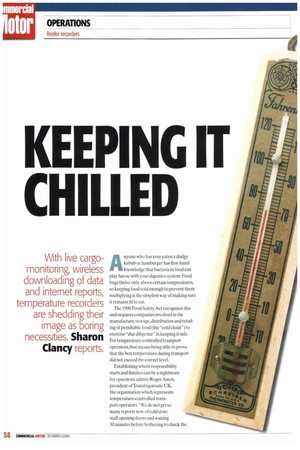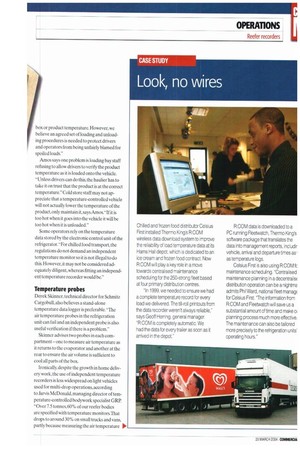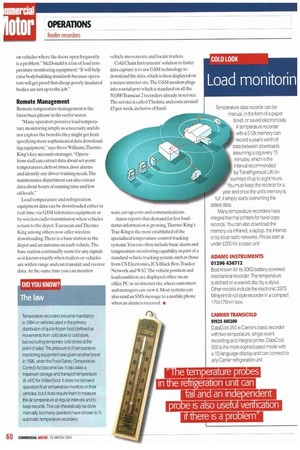KEEPING IT CHILLED
Page 58

Page 59

Page 60

If you've noticed an error in this article please click here to report it so we can fix it.
With live cargo monitoring, wireless downloading of data and Internet reports, temperature recorders are shedding their image as boring
necessities. Sharon Clancy reports. Anyone who has ever eaten a dodgy kebab or hamburger has first-hand knowledge that bacteria in food can play havoc with your digestive system. Food bugs thrive only above certain temperatures, so keeping food cold enough to prevent them multiplying is the simplest way of making sure it remains fit to eat.
The 1990 Food Safety Act recognises this and requires companies involved in the manufacture,storage,distribution and retailing of perishable food (the "cold chain-) to exercise-due diligence" in keeping it safe. For temperature-controlled transport operators, that means being able to prove that the box temperature during transport did not exceed the correct level.
Establishing where responsibility starts and finishes can be a nightmare for operators. admits Roger Amos, president ofTransfrigoroute UK, the organisation which represents temperature-controlled transport operators "We do not get so many reports now of cold store staff opening doors and waiting 30 minutes before bothering to check the box or product temperature. However, we believe an agreed set of loading and unloading procedures is needed to protect drivers and operators from being unfairly blamed for spoiled loads."
Amos says one problem is loading bay staff refusing to allow drivers to verify the product temperature as it is loaded onto the vehicle. "Unless drivers can do this, the haulier has to take it on trust that the product is at the correct temperature." Cold store staff may not appreciate that a temperature-controlled vehicle will not actually lower the temperature of the product, only maintain it, says Amos."If it is too hot when it goes into the vehicle it will be too hot when it is unloaded."
Some operators rely on the temperature data stored by the electronic control unit of the refrigerator."For chilled food transport, the regulations do not demand an independent temperature monitor so it is not illegal to do this. However, it may not be considered adequately diligent,whereas fitting an independent temperature recorder would be."
Temperature probes
Derek Skinner, technical director for Schmitz Cargobull, also believes a stand-alone temperature data logger is preferable. "The air temperature probes in the refrigeration unit can fail and an independent probe is also useful verification if there is a problem."
Skinner advises two probes in each compartment — one to measure air temperature as it returns to the evaporator and another at the rear to ensure the air volume is sufficient to cool all parts of the box.
Ironically, despite the growth in home delivery work, the use of independent temperature recorders is less widespread on light vehicles used for multi-drop operations, according to Jarvis McDonald.managing director of temperature-controlled bodywork specialist GRP "Over 7.5 tonnes, 60% of our reefer bodies are specified with temperature monitors.That drops to around 30% on small trucks and vans. partly because measuring the air temperature 10. on vehicles where the doors open frequently is a problem." McDonald is a fan of load temperature monitoring equipment:"It will help raise bodybuilding standards because operators will get proof that cheap, poorly insulated bodies are not up to the job."
Remote Management Remote tempe rat ure management is the latest buzz phrase in the reefer sector.
-Many operators perceive load temperature monitoring simply as a necessity and do not explore the benefits they might get from specifying more sophisticated data downloading equipment," says Steve Williams,Thermo King's key accounts manager."Operations staff can extract data about set-point temperatures, defrost times, door alarms and identify any driver training needs.The maintenance department can also extract data about hours of running time and low oil levels."
Load temperature and refrigeration equipment data can be downloaded either in real-time via GSM telematics equipment or by wireless radio transmission when vehicles return to the depot. Euroscan and Thermo King among others now offer wireless downloading. There is a base station in the depot and an antenna on each vehicle.'The base station continually scans for any signals so it knows exactly when trailers or vehicles are within range and can transmit and receive data. At the same time you can monitor vehicle movements and locate trailers.
Cold Chain Instruments' solution to faster data capture is to use GSM technology to download the data, which is then displayed on a secure internet site.The GSM modem plugs into a serial port which is standard on all the 50,000 Transcan 2 recorders already in service. The service is called TSedata, and costs around £5 per week, inclusive of hard ware, set-up costs and communications Amos reports that demand for live loadstatus information is growing. Thermo King's Trac-King is the most established of the specialised temperature-control tracking system& You can often include basic alarm and temperature-monitoring capability as part of a standard vehicle tracking system,such as those from CS Electronics,1CS Black Box,Tracker Network and WS2.The vehicle position and load condition are displayed either on an office PC or an internet site, where customers and managers can view it. Most systems can also send an SMS message to a mobile phone when an alarm is received.






























































































































































































